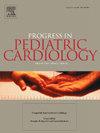Apnea mediated transient complete atrioventricular block in a pre-term neonate
IF 0.8
Q4 PEDIATRICS
引用次数: 0
Abstract
We present a previously unrecognized, reversible cause for complete atrioventricular block in the sick neonate. An 18 day old 33 weeker with Tetralogy of Fallot was admitted with sinus rhythm on ECG. Soon after, the baby developed episodes of apnea during which ECG showed complete atrioventricular block. This was unresponsive to atropine and isoprenaline, and heart rate continued to deteriorate. Mechanical ventilation was initiated in view of the critical condition and in preparation for an emergency temporary pacing wire insertion. Remarkably, ventilation restored sinus rhythm. The probable mechanisms by which apnea and acute hypoxia can cause atrioventricular block include carotid chemoreceptor mediated reflex vagal stimulation, depression of atrioventricular nodal conduction, and increase in endogenous adenosine levels. It is prudent to consider this reversible mechanism in the differential diagnosis of new onset atrioventricular block in the sick neonate, as early recognition may help avoid unnecessary invasive interventions.
早产新生儿呼吸暂停介导的短暂性完全房室传导阻滞
我们提出一个以前未被认识的,可逆的原因完全房室传导阻滞在生病的新生儿。一个18天33周的法洛四联症患者在心电图上发现窦性心律。不久之后,婴儿出现呼吸暂停发作,心电图显示完全房室传导阻滞。这对阿托品和异丙肾上腺素无反应,心率继续恶化。鉴于情况危急,并为紧急临时起搏导线插入做准备,启动了机械通气。值得注意的是,通气恢复了窦性心律。呼吸暂停和急性缺氧可引起房室传导阻滞的可能机制包括颈动脉化学受体介导的迷走神经反射刺激、房室结传导抑制和内源性腺苷水平升高。在患病新生儿新发房室传导阻滞的鉴别诊断中考虑这种可逆机制是谨慎的,因为早期识别可能有助于避免不必要的侵入性干预。
本文章由计算机程序翻译,如有差异,请以英文原文为准。
求助全文
约1分钟内获得全文
求助全文
来源期刊

PROGRESS IN PEDIATRIC CARDIOLOGY
PEDIATRICS-
CiteScore
0.90
自引率
11.10%
发文量
69
审稿时长
75 days
期刊介绍:
Progress in Pediatric Cardiology is an international journal of review presenting information and experienced opinion of importance in the understanding and management of cardiovascular diseases in children. Each issue is prepared by one or more Guest Editors and reviews a single subject, allowing for comprehensive presentations of complex, multifaceted or rapidly changing topics of clinical and investigative interest.
 求助内容:
求助内容: 应助结果提醒方式:
应助结果提醒方式:


